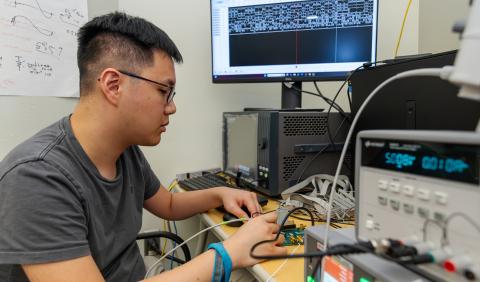
Tzu-Han Wang working on a circuit board with an analog chip connected to pattern generator instruments used to create continuous waveforms to test and analyze the performance of the chip.
Students experience the real-world analog chip tapeout process, with their designs being produced at Texas Instruments’ state-of-the-art wafer fabs.
Whether it is the sound of music through your headphones or the precise control of a robotic arm, analog circuits play a crucial role in both established and future technologies.
Analog does a lot of things, but in general, it functions as the interpreter between the real world and digital devices. It transforms signals — like sound waves, voltage levels, temperature, pressure, and light intensity — into information that digital systems can understand.
As the semiconductor industry evolves, the demand for skilled analog engineers continues to grow even in this digital world.
“Analog circuits remain vital because they enable the initial data acquisition from the environment,” said Assistant Professor Shaolan Li. “That’s just the application perspective, but they are also structurally very different than digital circuits. Students need hands-on experience with real-world measurements, which are crucial for mastering analog circuits.”
To meet this demand, the Georgia Tech School of Electrical and Computer Engineering (ECE) is collaborating with Texas Instruments (TI) to launch strategic educational opportunities aimed at providing students access to industry-grade analog chip design, fabrication, and testing processes. TI is a global semiconductor company that designs, manufactures, and sells analog and embedded processing chips.